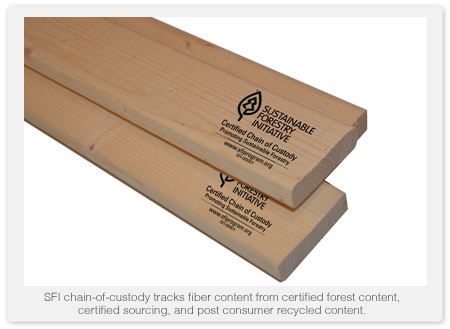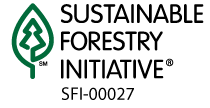Sustainable Forestry Initiative

SFI Program Participants believe forest landowners have an important stewardship responsibility and a commitment to society, and they recognize the importance of maintaining viable commercial, family forest, and conservation forest land bases. They support sustainable forestry practices on forestland they manage, and promote it on other lands. They support efforts to protect private property rights, and to help all private landowners manage their forestland sustainably. In keeping with this responsibility, SFI Program Participants shall have a written policy (or policies) to implement and achieve the following principles:
- Sustainable Forestry
- Forest Productivity and Health
- Protection of Water Resources
- Protection of Biological Diversity
- Aesthetics and Recreation
- Protection of Special Sites
- Legal Compliance
- Research
- Training and Education
- Community Involvement and Social Responsibility, and Respect for Indigenous Rights
- Transparency
- Continual Improvement
- Responsible Fiber Sourcing
These SFI principles are further refined in the SFI Standard found at www.forests.org. Among other requirements, SFI program participants must meet or exceed applicable water quality laws and regulations, with measures to manage and protect water bodies and riparian zones on certified lands. They must continually evaluate habitat and biodiversity impacts from forest activities - this leads to improved habitat quality, and protection of imperiled or critically imperiled species. SFI program participants must comply with the comprehensive forestry laws that apply to them in the United States and Canada. They must practice responsible forestry on their certified lands, as well as promote best management practices, awareness and training if they procure wood from lands in North America that are not certified. The SFI program is committed to improving the practice of forestry on all forestlands in North America, whether boreal forests or plantation forests, whether naturally regenerated or planted. Its philosophy is that healthy, productive forests yield immense environmental, social and economic benefits, and mitigate the impacts of climate change by absorbing and storing carbon in trees, soil and biomass. Forestland being converted to other uses could not be certified to the SFI Standard because it would not meet the requirement calling for prompt reforestation after the final harvest.
SFI Policy Documents: |
| SPI 2023 SFI Forest Management re-certification |
| 2022 SPI Policy on Indigenous Rights |

